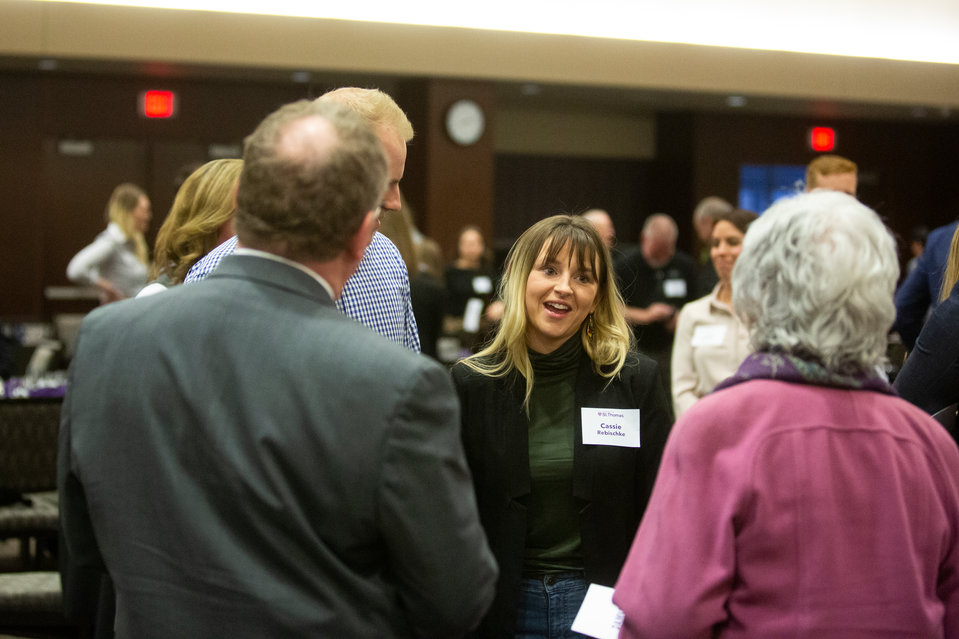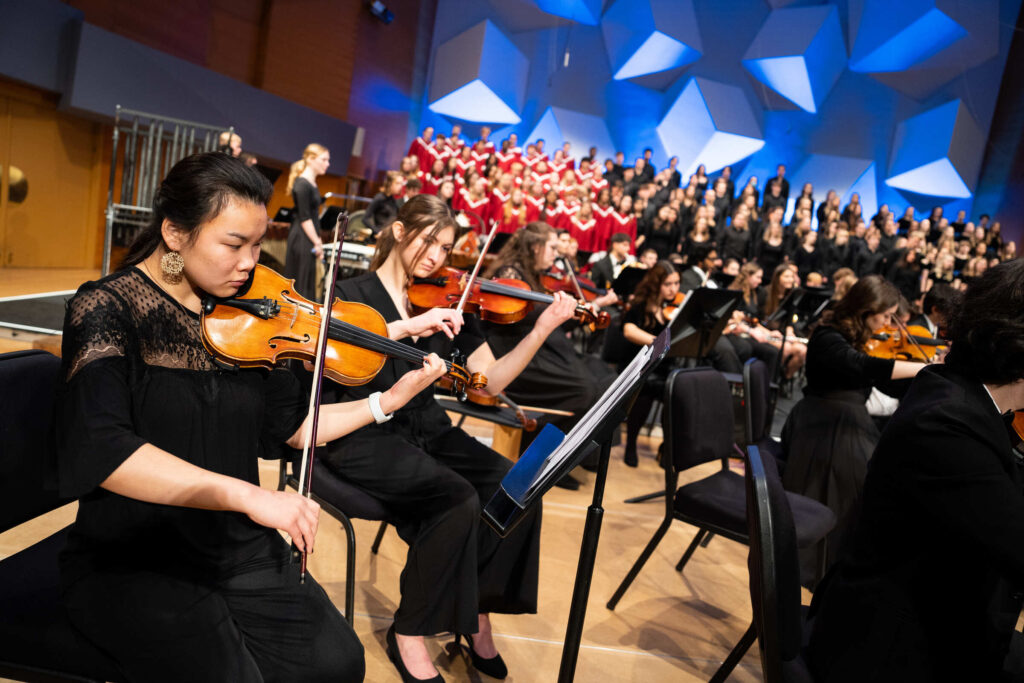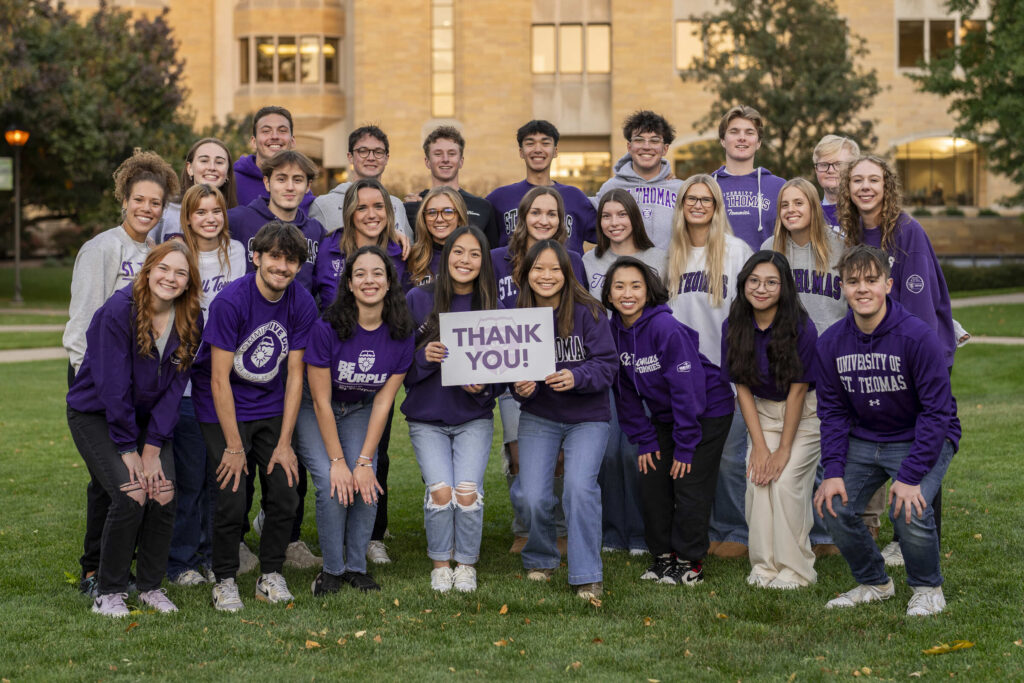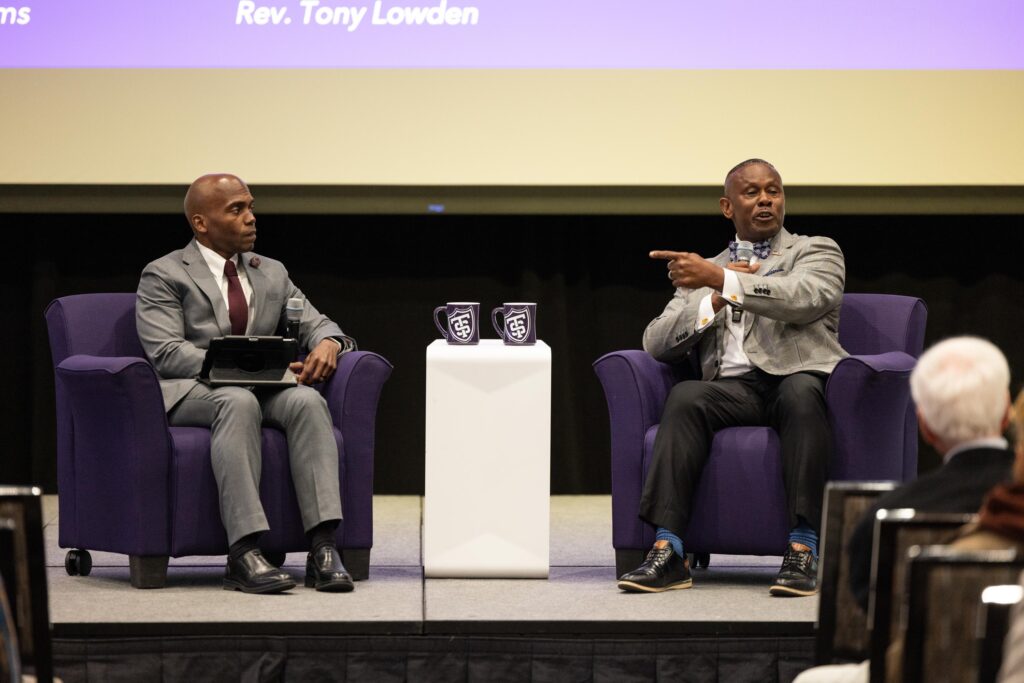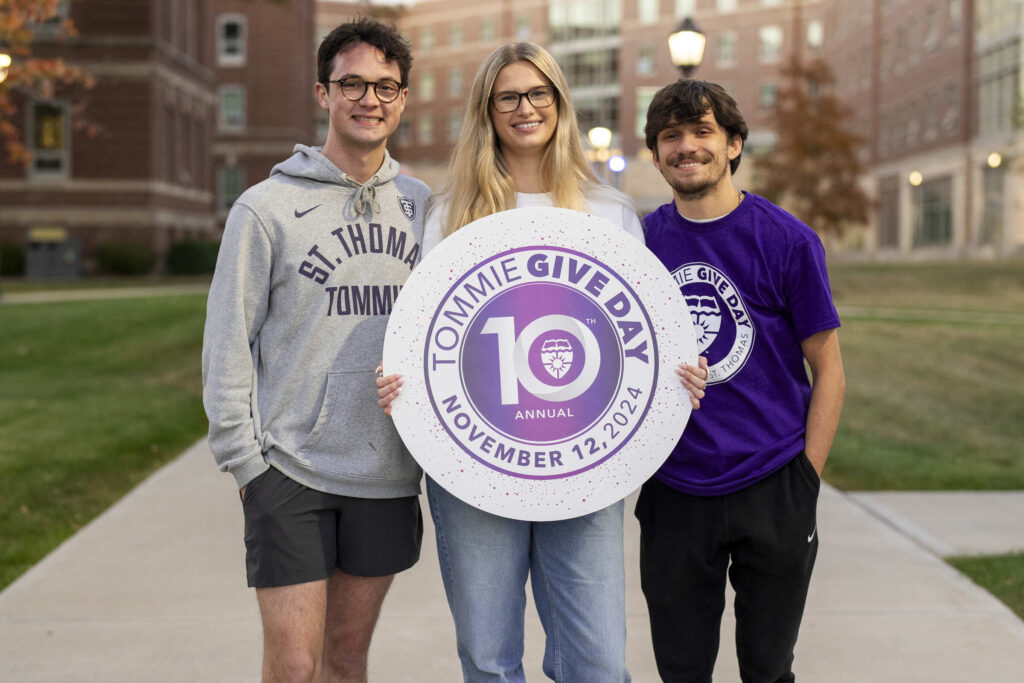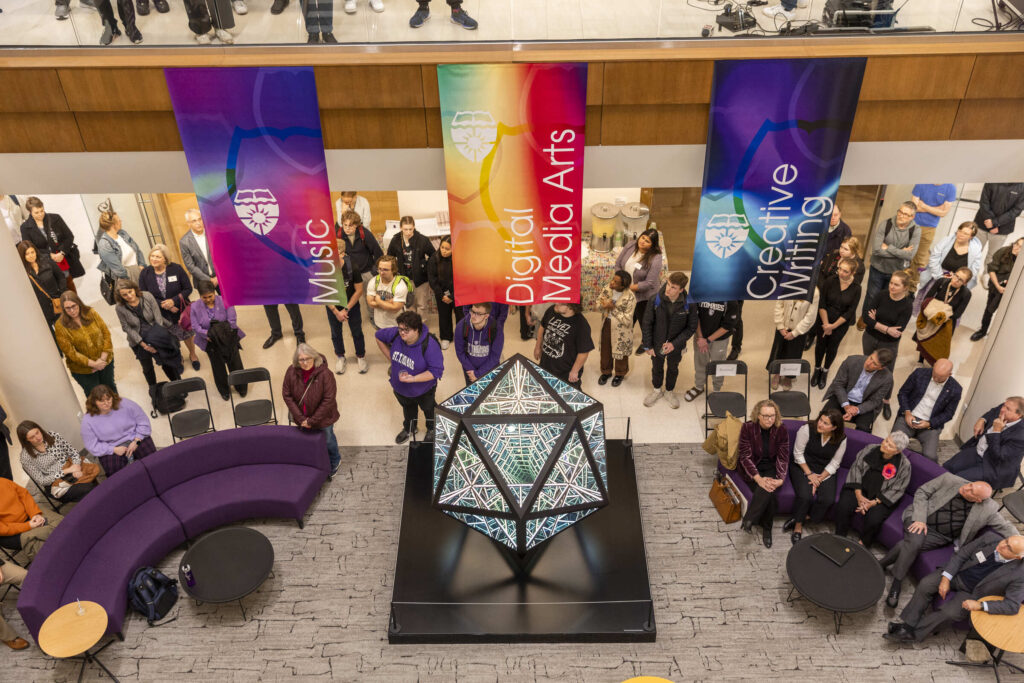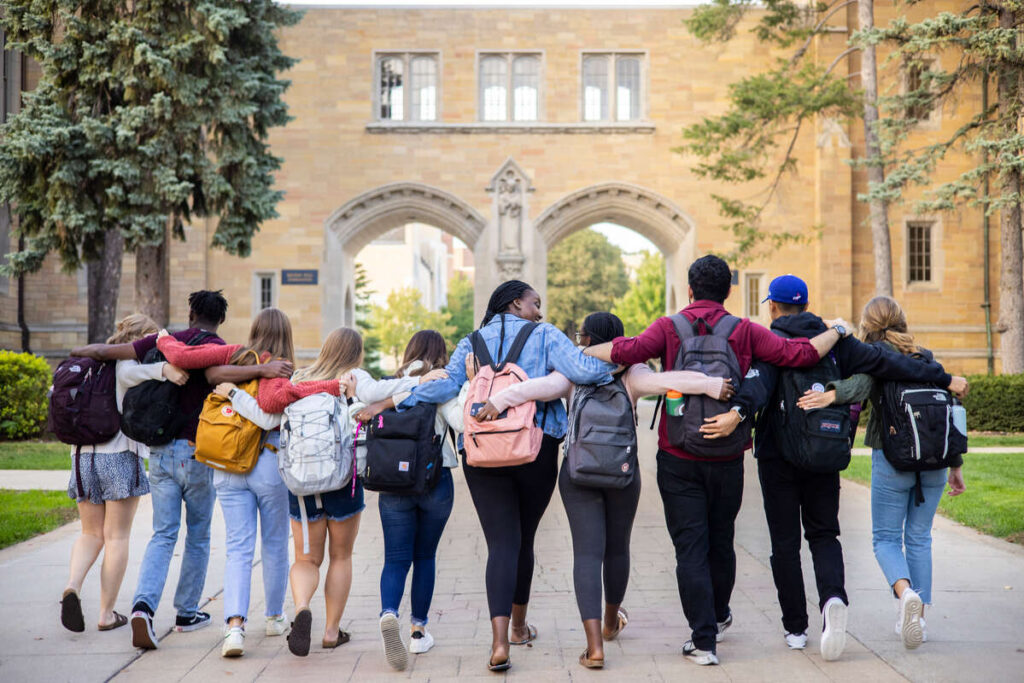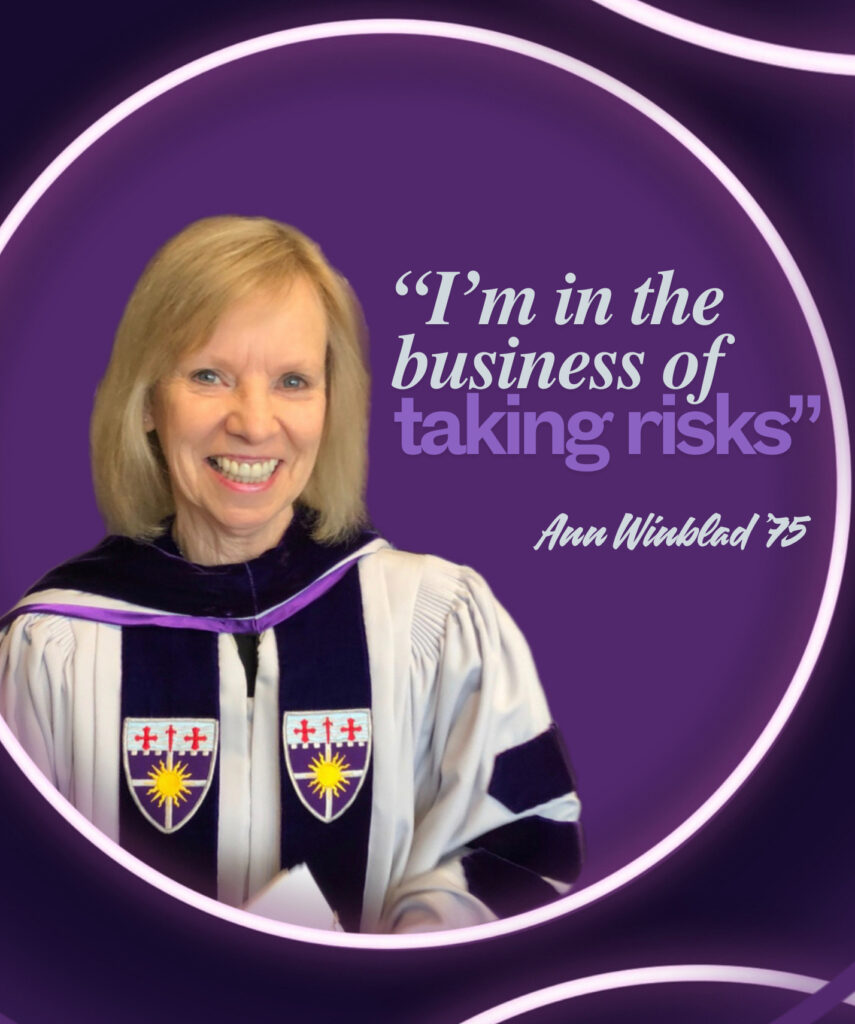Dozens of students, alumni and community members gathered April 15 to celebrate the Damus Awards, a St. Thomas philanthropic project that empowers students to award at least $25,000 to local nonprofits annually.
The event celebrated all the work this year’s nine-student Damus (which rhymes with “Thomas” and means “we give” in Latin) Board did to determine worthy nonprofits and grow in their own understanding of personal purpose and philanthropy.
“This program has allowed us, students, to grow in a way that no club or class has allowed me or pushed me to. Not only did I learn skills that can be applied to work and school settings, but more importantly I learned so much about myself during this process and what gives me joy,” said student board member Lauren Moll. “Thank you so much for this opportunity, pushing us out of our comfort zones, and facilitating a space where we could have free and open conversations.”
Students met for 18 hours throughout the spring semester in addition to making site visits to the 13 finalist nonprofits after narrowing down from 63 applicants. This year’s nonprofits awarded were Advocacy & Inclusion Matter; Breaking Free; Elpis Enterprises; Esperanza; and Small Sums.
“It’s really rewarding to see how much the out-of-classroom experience impacts their learning,” said Carley Stieg, student services specialist with Opus College of Business. “There’s so much they learn through hands-on experience with each other. The program empowers them to use a consensus model throughout the year [to decide on nonprofits to award], which stretches students beyond their usual methods of decision making. Damus Board members are committed to finding solutions the whole group can actively support.”
This year’s student board consisted of:
- Mackenna Cristilly '21
- Matthew Deakin '19
- Kate Gallagher '19
- Joel Gmach '21
- Maria Golberg
- Abbie Levang '19
- Lauren Moll '19
- Ali Sauer '19
- Abby Taffe '20
A decade of lessons
The Damus Board started in 2009 when Jackie Gibney (now Jackie Kocon) approached the university about funding an opportunity for students to practice and learn about philanthropy. A partnership formed with the Opus College of Business’ Business 200 program, which requires students to fulfill 40 hours of volunteer service.
Every year a group of students is selected from the program, and they determine an area of focus to support (This year’s focus was on nonprofits that reduce isolation.). They then create an application to send out to local businesses who have worked with Business 200 students, and open up for them to apply for an award. From those applications students narrow down to a list of finalists and then go for on-site visits.
“I believe these visits made our decisions even more difficult, for we had each immersed ourselves into the organizations and were passionate about what they were doing,” said senior Abbie Levang, who visited Breaking Free. “With that being said, I wish everyone were able to firsthand see the achievements of each one of these nonprofits. I’m very thankful to have been able to be a part of all this.”

Julie Reiter laughs at the Damus Awards Dinner in Woulfe Alumni Hall on April 15, 2019 in St. Paul.
"Thanks to their volunteering [through Business 200] they have a general sense of community issues, and know what some of the work of our local nonprofits looks like,” said Julie Reiter, Business Learning Through Service program director. “After they have gone on site visits, they have a much deeper understanding of the social issues these organizations are trying to address, and how they work. They were so excited about what they learned and felt so empowered because they had the privilege of deciding together where the funds should go.”
This year marked a revamped process as the Damus Board (called until this year the Gibney Board) refined its focus on student learning: Along with extensive professional development, each student works to understand and articulate their own personal purpose, taking that into their information gathering and advocacy for different nonprofits.
“To Jackie, that is such an important part of the process, that students explore their greater purpose in life,” Reiter said. “We remind them throughout the process to reflect on the purpose they articulated at the beginning and how that informs their role on the Damus Board.”
With 10 cohorts of students having gone through this process, many have had opportunity to reflect on the impact of the awards themselves, as well as the positive influence taking part had on St. Thomas students.
"I can't help but think that my time with the Board helped guide me down the path I have taken with my young career," Joe Zander '14 said. "I genuinely appreciate the Gibney family for not only their generosity, but how they decided to share their generosity with others. It is important to instill philanthropic values in everyone so no matter what path they take in life, they can always find a way to help those in need. The Board reinforced those values for me and I am sure it has done and will do the same for other students like me.”
“Being on the board changed my life. It really put the real world into perspective,” Tiara Gowen ’17 said. “The board allows students to not only give back but provide an educational experience about nonprofits and giving time, money and resources to be able to extend the care nonprofits can offer.”
“The board was by far one of the coolest things I participated in at St. Thomas,” Maddie Saarela ’15 said. “Through the experience I met so many new, talented and interesting people. My worldviews were broadened, and I felt empowered that one person can really make a difference. My class donated to youth and education. Today, I still find myself aligned to these areas.”
All five nonprofit organizations had members on hand April 15 to receive their awards and celebrate their work in the community. That work includes:
Advocacy & Inclusion Matter: AIM promotes independent living and full inclusion for people with intellectual and developmental disabilities in the community. Through its advocacy, wellness, education and socialization programs, it has served more than 1,200 people annually for more than a decade.
Breaking Free: Breaking Free supports sexually trafficked and prostituted women and their families through case management, advocacy, direct services, housing facilities and education. Over the past 20 years it has brought more than 7,500 clients out of isolation and into the community.
Elpis Enterprises: Elpis operates social enterprises to use the power of small businesses to provide young people who are homeless or have unstable housing with paid work experience and employment readiness training – fostering productivity and community connections for each of its trainees.
Esperanza: Esperanza started as a summer camp for at-risk youth, and has grown into a community hub for low-income families of color, hosting free meals, back-to-school drives, a year-round soccer program, and many other programs that empower youth and strengthen community.
Small Sums: Small Sums gives back-to-work assistance to homeless individuals by providing them work clothes, tools, bus passes and funds to cover fees required for the job. Removing these barriers to employment helps them move out of homelessness and into a stable community.
